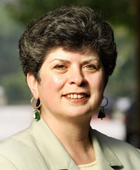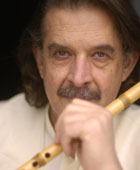
|
Irvine, Calif., July 25, 2006 UCI's Persian center names first key appointmentsTwo internationally recognized scholars fill positions in the Dr. Samuel M. Jordan Center for Persian Studies and Culture

Two internationally esteemed scholars have joined UCI as endowed professors in the Dr. Samuel M. Jordan Center for Persian Studies and Culture-- Nasrin Rahimieh, a scholar of modern Iranian literature and cinema, and Hossein Omoumi, a scholar of traditional Persian music and accomplished player of the ney, the Persian reed flute. Rahimieh will serve as director of the center and the Maseeh Chair in Persian Studies and Culture. She is a professor of comparative literature in the School of Humanities. She joins UCI from Canada's McMaster University where she was the humanities dean. Best known for her research on intercultural encounters between Iran and the West, Rahimieh is a global leader in Persian studies and recently was elected president of the International Society for Iranian Studies, a community of more than 500 scholars. 
Omoumi has been hired as the Maseeh Professor in Persian Performing Arts in the Claire Trevor School of the Arts, and comes to UCI from the Seattle-based Haft Dastgah Association, which he founded to preserve classical Persian music tradition. In addition to teaching classical Persian music at the University of Washington in Seattle, UCLA and the University of Paris-Sorbonne, Omoumi has performed in the United States and throughout Europe. "I am delighted that these distinguished scholars have joined UCI's faculty, realizing the vision of an interdisciplinary center that brings together scholars of Persian history, language, visual culture, arts and literature," said Karen Lawrence, dean of the School of Humanities. "Nasrin Rahimieh's intellectual contributions to Persian studies and her leadership experience will be wonderful assets for the Dr. Samuel M. Jordan Center for Persian Studies and Culture and the university. Professor Rahimieh speaks five languages, and with her linguistic fluency and charisma, she will be a wonderful liaison between the university and the community." The endowed professorships were created in 2005 by funding from microtechnology pioneer Fariborz Maseeh and the Massiah Foundation. Maseeh pledged $2 million to create these positions and the Dr. Samuel M. Jordan Center for Persian Studies and Culture -- named after a missionary in the early 1900s who became a leading educational figure in Iran. The center is the first interdisciplinary center in the University of California system dedicated entirely to Persian studies not based in a department of Near East or Middle East studies. Rahimieh's research has explored historic, literary, cinematic and artistic aspects of Iranian culture, with a particular focus on cultural encounters between Iran and the West and the issue of exile. Her 2001 book, "Missing Persians: Discovering Voices in Iranian Cultural Heritage," explores the issue of cultural identity through the narratives of displaced Persians from the 16th century through modern times. "I am excited to direct the center, particularly at this time when a bridge between Iranian culture and the rest of the world is so desperately needed," said Rahimieh. "This is a wonderful opportunity to reach out to scholars and community organizations in Southern California and internationally to encourage better understanding of Iranian culture in a global context, and I am especially pleased that Hossein Omoumi will be joining me in this endeavor." Omoumi began studying the Persian ney at age 14 with his father. After 40 years of experience in studying and teaching classical Persian music and architecture, he created a simple and fast method to teach the very complex systems of Persian music. His research has improved the functionality of the ney as well as the tombak and daf, traditional Persian drums. He developed a mechanism that can be added to the ney, enabling the user to play notes that were impossible to create in the past, and he invented a system that adjusts surface tension on the tombak and daf, allowing the player to tune the instruments. Omoumi has performed at the J. Paul Getty Museum in Los Angeles, and at several venues in France, Turkey, Greece, Denmark, Switzerland and England. "Professor Omoumi brings to the field an extensive interest in and knowledge of Persian music theory, which in itself is an impressive accomplishment given the breadth and depth of this rich, complex musical tradition," said Nohema Fernández, dean of the arts school. "He is one of a handful of senior experts in this field, and having him on our faculty will place us in a unique position in the worldwide ethnomusicological community." Omoumi is excited to bring his legacy of preserving traditional Persian music to UCI. Though he has a doctorate in architecture, Omoumi says music is his passion. "Iranian music has beautiful melodic patterns, and it is rich with history because it is largely based on traditional literature and poetry. It is important that we preserve this heritage," Omoumi said. "I look forward to sharing this history with my colleagues at UCI and with the community at large." Their appointments began July 1. A third endowed professorship also funded by Maseeh, the Howard Baskerville Professor in the School of Humanities, will be filled in the near future. The center is administered by the School of Humanities, which includes the basic disciplines of language, literature, history, philosophy and visual culture that deal with multiple dimensions of human experience -- individual and social, past and present. The center brings together faculty from across disciplines. About the University of California, Irvine: The University of California, Irvine is a top-ranked university dedicated to research, scholarship and community service. Founded in 1965, UCI is among the fastest-growing University of California campuses, with more than 24,000 undergraduate and graduate students and about 1,400 faculty members. The second-largest employer in dynamic Orange County, UCI contributes an annual economic impact of $3.3 billion. For more UCI news, visit www.today.uci.edu. Television: UCI has a broadcast studio available for live or taped interviews. For more information, visit http://today.uci.edu/broadcast. News Radio: UCI maintains on campus an ISDN for conducting interviews with its faculty and experts. The use of this line is available free-of-charge to radio news programs/stations who wish to interview UCI faculty and experts. Use of ISDN line limited by availability and approval by the university. |